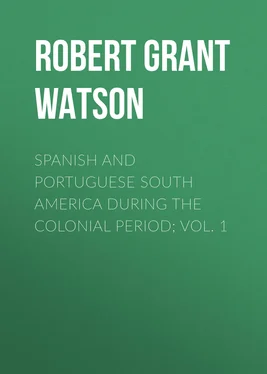Robert Grant Watson - Spanish and Portuguese South America during the Colonial Period; Vol. 1
Здесь есть возможность читать онлайн «Robert Grant Watson - Spanish and Portuguese South America during the Colonial Period; Vol. 1» — ознакомительный отрывок электронной книги совершенно бесплатно, а после прочтения отрывка купить полную версию. В некоторых случаях можно слушать аудио, скачать через торрент в формате fb2 и присутствует краткое содержание. Жанр: foreign_prose, История, foreign_edu, foreign_antique, на английском языке. Описание произведения, (предисловие) а так же отзывы посетителей доступны на портале библиотеки ЛибКат.
- Название:Spanish and Portuguese South America during the Colonial Period; Vol. 1
- Автор:
- Жанр:
- Год:неизвестен
- ISBN:нет данных
- Рейтинг книги:5 / 5. Голосов: 1
-
Избранное:Добавить в избранное
- Отзывы:
-
Ваша оценка:
- 100
- 1
- 2
- 3
- 4
- 5
Spanish and Portuguese South America during the Colonial Period; Vol. 1: краткое содержание, описание и аннотация
Предлагаем к чтению аннотацию, описание, краткое содержание или предисловие (зависит от того, что написал сам автор книги «Spanish and Portuguese South America during the Colonial Period; Vol. 1»). Если вы не нашли необходимую информацию о книге — напишите в комментариях, мы постараемся отыскать её.
Spanish and Portuguese South America during the Colonial Period; Vol. 1 — читать онлайн ознакомительный отрывок
Ниже представлен текст книги, разбитый по страницам. Система сохранения места последней прочитанной страницы, позволяет с удобством читать онлайн бесплатно книгу «Spanish and Portuguese South America during the Colonial Period; Vol. 1», без необходимости каждый раз заново искать на чём Вы остановились. Поставьте закладку, и сможете в любой момент перейти на страницу, на которой закончили чтение.
Интервал:
Закладка:
The Spaniards had still to pass through the territories of the most warlike cacique of the mountains. His reputation was so considerable that Nuñez dreaded to attack him with his worn-out followers; he therefore had recourse to stratagem. Taking with him seventy of the strongest of his party, he made a forced march to the neighbourhood of the cacique’s residence, which at midnight he suddenly assaulted, capturing Tubanamá and all his family. The cacique , being threatened with death, agreed to purchase his life with jewels of gold to the value of three thousand crowns, and further to levy double that sum from his subjects; which having done, he was set at liberty.
1514.
Nuñez, returning to the village where he had left his men, now resumed his march to Darien . He and his party being much affected by the climate, could proceed but slowly; but they at length arrived on the sea coast in the territories of their ally Comagre. That cacique was now dead, and had been succeeded by his son, the youth who had first given information to Nuñez of the existence of the Southern Sea. Nuñez next proceeded to Ponca , where he heard of the arrival of a ship and caravel from Hispaniola . Hastening onwards to Coyba , the residence of his ally Careta, he embarked in the brigantine on January 28th, 1514, and arrived at Darien on the following day. He had been absent for five months, and was met with the most joyful welcome on the part of the entire colony.
CHAPTER III.
THE COLONY OF DARIEN; FATE OF VASCO NUÑEZ
Once more at Darien , Vasco Nuñez lost no time in drawing up for the king a report of his expedition across the mountains to the Southern Sea, in which report he states that during the expedition he had not lost a single man in battle. But, by a singular mischance, the vessel which bore his friend and messenger, Arbolanche, who had himself taken part in the toils and dangers which he was to describe, did not sail from Darien until the beginning of March. This delay ruined the rising fortunes of Vasco Nuñez.
The Bachelor Enciso, as has been already said, had carried his complaints against Nuñez to the foot of the throne; and when, in May 1513, he was followed by Caÿzedo and Colmenares with their glowing account of the province of Zenu , with its mountain streams that flowed over golden sands, their news served but to hasten the appointment of a governor over this favoured region. The royal choice fell, on the recommendation of Fonseca the Bishop of Burgos, upon Don Pedro Arias Davila, commonly called Pedrarias, who, on July 27th of the same year, was appointed ruler over Darien . The new governor was an elderly gentleman of rank, who had been brought up in the royal household and had afterwards distinguished himself as a soldier; but he has been well called, as his subsequent actions proved him to be, “a suspicious, fiery, arbitrary old man.” 6 6 Helps.
The envoys of Nuñez had asked King Ferdinand for a thousand men, wherewith to enable their master to make the discovery of the Southern Sea. Ferdinand fully appreciated the importance of the enterprise; and, although he did not intend it for Nuñez, he assigned twelve hundred men to Pedrarias for its accomplishment. It so happened that at this time the Great Captain, the famous Gonsalvo de Córdova, was preparing to return to Naples; and the chivalry of Spain were thronging to enlist under his banner. His armament was, however, countermanded when on the point of sailing; and thus a large number of young nobles and cavaliers, who had set their hearts on winning their spurs, had their plans suddenly thwarted. Pedrarias had a host of volunteers anxious to join his expedition to the country which had already received the appellation of Castilla del Oro , or Golden Castile. In order to enable him to comply with the wishes of these applicants, he was permitted to increase his force to the number of fifteen hundred men; but in the end some two thousand embarked. Pedrarias was likewise accompanied by a bishop and four principal officers, one of whom was the Bachelor Enciso, now appointed alguazil mayor . He was also accompanied by his wife Doña Isabella de Bobadilla. He received instructions not to admit any lawyers into his colony,—an instruction subsequently more than once repeated in respect to Spanish-American colonies.
1514.
Scarcely had his fleet of fifteen vessels set sail from San Lucar , on the 12th of April 1514, when Arbolanche arrived, bearing the news of the glorious exploits of Nuñez. Had he come but a few days earlier, how widely different would have been the future of that cavalier! King Ferdinand gazed with delight on the pearls and gold which the messenger of Nuñez laid before him, and his imagination was carried away by the tale of the unknown seas and wonderful realms which were about to be brought under his sway. The popularity of Nuñez suddenly became unbounded, and the fame of his exploits resounded throughout Spain. The ill impression which had been produced on the king’s mind by the reports of Enciso was forthwith obliterated, and the Bishop of Burgos was instructed to devise some means of rewarding his surpassing services. But meanwhile the cavalier himself was afar off, and the waves of the Atlantic were fast bearing to Darien the jealous old man who was to see in Nuñez only one who had robbed him of the glory which he had proposed to himself of being the first discoverer of the Southern Sea and the conqueror of the regions of gold and pearls on its shores.
Meanwhile Vasco Nuñez was governing the region subjected to his rule in such a manner as to prove that the popular selection which had elevated him to the position of chief was justified by his qualities as a peaceful ruler no less than by his exploits as a warlike adventurer. The settlement contained upwards of two hundred houses or huts, and the constant effort of the captain-general was to bring the neighbourhood into such a state of cultivation as to render Darien independent of Europe for supplies. Its population now amounted to about five hundred Europeans and fifteen hundred Indians. The climate being depressing, Nuñez, who was a born governor, took advantage of every means to keep his people in good spirits, devoting the holidays as they came round to national sports and games, including tilting matches. He was singularly successful in securing the friendship, as well as in gaining the respect, of the natives; so that the Spaniards could travel, even singly, all over the district in perfect safety. It was certainly a circumstance full of misfortune, as well for Spain as for the inhabitants of the Isthmus, that when, after the experience of so many unfortunate colonising expeditions and so many incapable leaders, one was at length found admirably suited alike for the requirements of peace and of war, he should have had so soon to give place to a man whose age unfitted him to fulfil the duties of leader, and whose temper prevented him from recognising the merits of those who acted under him.
1514.
In June the fleet of Pedrarias arrived in the Gulf of Urabá . The new governor, knowing the character and the renown of Nuñez, was somewhat apprehensive lest he should decline to render up peaceful possession of his government, and he accordingly thought it prudent to cast anchor about a league and a half from the shore, and to send a messenger in advance to announce his arrival. He need not, however, have felt any misgiving; for Nuñez forthwith sent back his messenger with congratulations on his safe arrival, and with the expression of his own readiness and that of all the colony to obey his orders. It is true that some fiery adherents of the popular leader expressed their desire to repel the intruder; but these were at once discountenanced by their chief. The new governor, disembarking on the last day of June, made his entrance into Darien at the head of two thousand armed men, he leading his wife by the one hand and having Bishop Quevedo on the other; whilst a train of youthful cavaliers formed his body-guard. Vasco Nuñez came forth unarmed to meet him, attended by a detachment of his scarred and veteran troops. He conducted his guests to his humble straw-thatched abode, where he laid before them such a repast as this embryo city of the forest might afford, the only beverage procurable being water. We may well believe that the courtly cavaliers who formed the governor’s train were somewhat taken aback by the simple nature of their first entertainment in Golden Castile.
Читать дальшеИнтервал:
Закладка:
Похожие книги на «Spanish and Portuguese South America during the Colonial Period; Vol. 1»
Представляем Вашему вниманию похожие книги на «Spanish and Portuguese South America during the Colonial Period; Vol. 1» списком для выбора. Мы отобрали схожую по названию и смыслу литературу в надежде предоставить читателям больше вариантов отыскать новые, интересные, ещё непрочитанные произведения.
Обсуждение, отзывы о книге «Spanish and Portuguese South America during the Colonial Period; Vol. 1» и просто собственные мнения читателей. Оставьте ваши комментарии, напишите, что Вы думаете о произведении, его смысле или главных героях. Укажите что конкретно понравилось, а что нет, и почему Вы так считаете.












